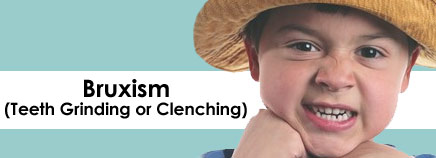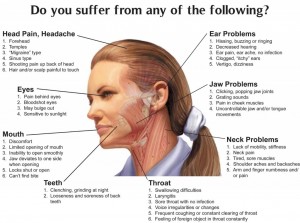What´s Bruxism?
It is when you clench or grind your teeth, commonly at night.
The term clenching means tightly clamping your top and bottom teeth together, especially the back teeth. The stressful force of clenching causes pressure on the muscles, tissues and other structures around your jaw. This can lead to jaw joint disorders, jaw pain and soreness, headaches, earaches, damaged teeth and other problems. These symptoms are often collectively referred to as «TMD» or temperomandibular disorder.
Many people in Torrevieja clench also grind their teeth. Grinding is when you slide your teeth over each other, generally in a sideways, back-and-forth movement. This action may wear down your teeth and be noisy enough at night to bother sleeping partners. Like clenching, grinding can lead to jaw pain and other problems.
Why people grind their teeth?
Many reasons:
- Chronic pain, it could be a painful nerve in the foot, compressed inflamed disc in the spine, or a painful osteoarthritic hip.
- Struggling to breathe through a compromises airway, like a sleep apnea, cessation of breathing for 10 seconds.
- Life’s anxieties, divorce, job, relationships, etc.
- Any combinations of them.
Our patients come to us in Torrevieja with headaches, facial pains, limited opening of the jaws, jaw noises (popping and clicking), Bruxism (grinding and clenching), worn teeth, broken teeth, sleep disordered breathing such as sleep apnea, snoring etc.
It is important to understand that the head and the face is the monitor of the health of the body. The chewing muscles are in balance with the muscles in front of the neck and the muscles in the back of the neck. These muscles have a particular amount of activity and tone which is based on the stimulation it gets from the brain and the spinal cord (Central Nervous System). People in Torrevieja clench, grind or both because of increases stimulation from the brain or spinal cord (Central Nervous System) which directly results from various amounts of pain, breathing dysfunction or anxiety leading to breakdown of the toughest joint in the body
Migraine, cluster headaches, hyping headache, morning (tension) headache in both adults and children are related to sleep apnea and disturbed sleep.
Headaches have been found in 65% of patients come to Lucrecia Botella with nocturnal bruxism (night time grinding).
People who grind their teeth use 3 times the force than people who do not.
Bruxism happens as a subconscious activity and therefore unawareness of the activity is common. People brux more when they are on their backs and they also suffer more sleep apnea in that position.
Treatment
The basic outline of treatment is to initially treat the cause of bruxism.
The need for treating chronic pain, breathing and sleep disorders and anxiety is necessary to stop a person from bruxing.
Special orthotics/splints that are designed to maximize function and ability to breathe properly, are worn during the day and/or night. The treatment generally last for about 3 to 6 months. This is generally called the Phase 1 of treatment. If symptoms return then we need to go to Phase 2 of treatment that involves either orthodontics (braces, Invisalign) or prosthodontics (crowns/veneers) rehabilitation.
In Lucrecia Botella, now, we offer a TMJ physiotherapy treatment, that 75% of the TMD group is resolved their condition within 3 months, which is certainly consistent. The vast majority improve within a few weeks of commencing TMJ treatment.
Generally 70% of people tend to improve dramatically after this treatment. If suffering from sleep disorders then the night orthotics may have to be worn for life so as to give you adequate, sound, refreshing sleep.
Come and visit us in Torrevieja.
We´ll show you all the TMJ treatments alternatives.





